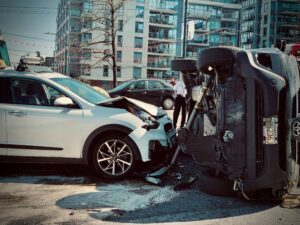While vehicular manslaughter is not the most severe form of vehicular homicide, it is the most common type of vehicular homicide charge that you will see in Arizona.
The most frequently charged vehicular homicide offense in Arizona is vehicular manslaughter. But you can be charged with any of the Arizona homicide classifications:
In Arizona, a Vehicular Manslaughter conviction requires the prosecution to prove that you recklessly caused the death of another person. A.R.S. § 13-1103(A)(1). This means that the State must prove that:
The risk must be of such nature and degree that disregarding it was a gross deviation from what a reasonable person would have done in the situation. There is no one specific act of recklessness that results in a Vehicular Manslaughter charge.
Charge includes:
In Arizona, vehicular manslaughter sentencing falls under the same guidelines that mandate all vehicular homicide sentencing. Vehicular manslaughter is charged as a Class 2 Dangerous Felony offense. If convicted, you face between:
SIDE NOTE: If convicted, probation is not available, even on a first offense.

Second Degree Vehicular Homicide is a more serious charge than Vehicular Manslaughter. After Vehicular Manslaughter, it is the second most common type of Vehicular Homicide offense charged in Arizona.
Under Arizona law, A.R.S. § 13-1104(A)(3), a second degree vehicular homicide conviction requires the prosecution to prove that:
Second-degree vehicular homicide requires an additional component that you were acting under circumstances manifesting extreme indifference to human life. This is what makes it more serious than Vehicular Manslaughter.
There is no one specific type of conduct that qualifies as manifesting extreme indifference to human life. Typically, the prosecution will consider you committing a combination of any two or more acts of reckless behavior as amounting to circumstances manifesting extreme indifference to human life. For example:
In Arizona, second-degree vehicular homicide is a Class 1 Dangerous Felony offense. If convicted, you face between:
SIDE NOTE: If convicted, probation is not available, even on a first offense.

Vehicular negligent homicide is the least severe type of vehicular homicide charge you can face in Arizona. While the least severe, it is by no means insignificant.
In Arizona, to be convicted of vehicular negligent homicide, the prosecution is required to prove that you caused the death of another person with criminal negligence pursuant to A.R.S. § 13-1102. This means that the prosecution must prove that:
The risk must be such that the failure to perceive it is a gross deviation from what a reasonable person would observe in the situation.
Example. A parent is driving with a young child on their lap rather than in a car seat when they cause a car accident. This may result in a charge of vehicular negligent homicide.
If you are facing any of these charges, it’s crucial to consult a Phoenix vehicular homicide attorney as soon as possible. Our experienced legal team understands the complexities of vehicular homicide and related offenses, and we know how to build a strong defense on your behalf. We will thoroughly investigate the circumstances of your case, challenge the prosecution’s evidence, and work tirelessly to protect your rights and your future. At Feldman & Royle, we provide personalized legal strategies, aggressive representation, and compassionate support every step of the way to help you achieve the best possible outcome.
The difference is whether you were aware of the risk or failed to recognize the risk. For vehicular manslaughter, you must have been aware of a substantial risk and consciously disregarded the risk that your conduct would cause death. Negligent homicide only requires that you failed to recognize the risk.
If, while excessively speeding, you cause an accident that results in the death of another person, then you may face a charge of Negligent Homicide – Vehicular or Vehicular Manslaughter, depending on your speed.
In general, however, you will not see the State charge people with vehicular negligent homicide. What typically occurs is that the State charges you with vehicular manslaughter. Then, only if your attorney is able to successfully negotiate a plea bargain that drops the charge down, you may be able to plead guilty to vehicular negligent homicide instead of the more serious charge. If a Vehicular Manslaughter case goes to trial, then a jury could also find you guilty of the lesser-included offense of Negligent Homicide – Vehicular if the jury has a reasonable doubt as to whether you committed vehicular manslaughter.
In Arizona, vehicular negligent homicide is a Class 4 Dangerous Felony offense. If convicted, the sentence for vehicular homicide under a negligence theory is anywhere between:
SIDE NOTE: If convicted, probation is not available, even on a first offense.

The most serious type of Vehicular Homicide you can be charged with in Arizona is first-degree vehicular felony murder.
While you can certainly commit first degree vehicular homicide by premeditating and using your car to murder someone, the most common way you can be charged with first degree vehicular homicide is with vehicular felony murder. A.R.S. § 13-1105. First degree vehicular felony murder requires the prosecution to prove that:
In Arizona, first degree vehicular felony murder is a Class 1 Dangerous Felony. If convicted, the sentence for vehicular homicide pursuant to a theory of felony murder is anywhere from:
A person who is sentenced to natural life imprisonment may be released after 25 years (if the victim was 15 years old or older) and after 35 years (if the victim was under the age of 15 or was an unborn child).
A person who is sentenced to natural life imprisonment is not eligible for parole or release from prison on any basis.
If you are convicted of vehicular homicide, then MVD will revoke your driver’s license for 3 years. A.R.S. §§ 28-3304, 28-3315. Your driving privileges will not be automatically reinstated after the 3 years have passed. You must complete a Revocation Application (also called an Investigation Packet) with MVD and pay a reinstatement fee.
SIDE NOTE: Before applying for reinstatement, you must have satisfied any other court or MVD requirements, such as paying all fines and criminal restitution or completing traffic survival school.
Arizona charges vehicular homicide as a Dangerous Offense. An offense is a Dangerous Offense if it involves the use of a Dangerous Instrument. A.R.S. § 13-105(13). A Dangerous Instrument means anything that is readily capable of causing death or serious physical injury under the circumstances in which it is used. A.R.S. § 13-105(12).
When the prosecution charges you with Vehicular Homicide, it will also allege that your car was a Dangerous Instrument. If the prosecution proves that your car was a Dangerous Instrument, then you face mandatory prison as a sentence. This means that even if you have no prior criminal record, you will not be eligible for probation and must be sentenced to prison.

If you’re facing charges for a fatal accident, a Phoenix vehicular homicide attorney can help you understand your legal options and build a strong defense. Vehicular homicide cases often involve complex factors, such as road conditions, mechanical failures, or the actions of other drivers. The right defense strategy can challenge the prosecution’s claims and work toward reducing or dismissing the charges against you.
The main defense to a Vehicular Homicide charge is causation—that your actions did not cause the death of the other person.
If the intervening event was unforeseeable and out of the ordinary, then it is called a superseding intervening event.
SIDE NOTE: A victim’s failure to wear a seat belt or helmet cannot be used as a defense to Vehicular Homicide. This is because Arizona law states that drivers should reasonably foresee that people on the road may not wear seat belts or helmets.
Another way to defend against a Vehicular Homicide charge is to attack the State’s evidence. Examples of ways to challenge the State’s evidence include:
Your attorney may also raise legal challenges against a vehicular homicide charge by filing and litigating certain legal motions. Examples of possible legal challenges include:
For example, if the police failed to obtain your consent or a valid search warrant to take a sample of your blood for testing or to retrieve data from your car’s Black Box (event data recorder or crash data recorder), then you can fight to have that evidence thrown out.
If the police failed to read you your Miranda rights before questioning you, then you can fight to prevent the prosecution from using any of your admissions or statements against you.
If you asserted your right to an attorney and the police failed to give you an opportunity to speak with an attorney, then you can fight to have evidence thrown out or to even have your case dismissed. It depends on how the police’s denial of your right to counsel impacted your ability to defend against your Vehicular Homicide charge.
Example. If you are charged with vehicular manslaughter based on a DUI and were denied the right to counsel, then you may have lost the ability to obtain evidence in your favor through an independent blood test. The police’s denial of your right to counsel would have ruined your ability to challenge the prosecution’s evidence against you.

Vehicular homicide charges are very serious crimes that come with harsh penalties, including mandatory prison time for a first offense. If you or a loved one has been arrested for or charged with vehicular homicide, you need to hire an experienced vehicular homicide attorney as soon as possible to protect your rights and defend against this serious charge. The vehicular homicide attorneys and lawyers at Feldman & Royle have extensive experience and knowledge to help you fight these types of charges. Call today for a FREE and confidential consultation.
When you’re accused of vehicular homicide in Arizona, the stakes couldn’t be higher — your freedom, your reputation, and your future are all on the line. At Feldman & Royle, we understand the fear and uncertainty that come with such serious charges. A single moment on the road can lead to devastating consequences, but it doesn’t have to define the rest of your life. Our dedicated defense team fights with precision, skill, and unwavering commitment to protect your rights and guide you through this critical time.
Here’s what sets our vehicular homicide defense apart:

No tags assigned to this post.